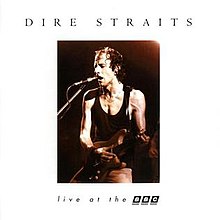Live at the BBC (Dire Straits album)
This article needs additional citations for verification. (May 2021) |
| Live at the BBC | ||||
|---|---|---|---|---|
 | ||||
| Live album by | ||||
| Released | 26 June 1995 | |||
| Recorded | BBC Studios, London, 22 July 1978, 31 January 1981 | |||
| Genre | Roots rock | |||
| Length | 46:01 | |||
| Label | Windsong (UK) Vertigo (International) Warner Bros. (US) | |||
| Producer | Various | |||
| Dire Straits chronology | ||||
| ||||
Live at the BBC is a live album by British rock band Dire Straits, released on 26 June 1995 on Vertigo Records internationally, and by Warner Bros. Records in the United States. The album was recorded on 22 July 1978 at BBC Studios in London, with one track recorded on 31 January 1981. The studio versions of the first six songs were released on Dire Straits. Live at the BBC was the band's third live album, preceded by Alchemy: Dire Straits Live (1984) and On the Night (1993).
Release
[edit]Live at the BBC was released on 26 June 1995, after the group officially disbanded. According to Knopfler, the album was released because Dire Straits still owed one album to Phonogram Records (now Mercury Records). The album was a means to end the contract before Knopfler began his solo career (still signed to Mercury).
Live at the BBC was re-released in November 2023 for the box set Live 1978-1992.
Composition
[edit]Live at the BBC consists of eight songs, the first seven recorded for the BBC Live in Concert series on 22 July 1978. The eighth song, "Tunnel of Love", was recorded at the Rockpop concert in Dortmund the 19th of December 1980.[1]
The album features one unreleased song, "What's the Matter Baby?", co-written by Mark Knopfler and his brother David. It is the only song to appear on a Dire Straits album not written exclusively by Mark Knopfler; while two other Dire Straits songs list Knopfler sharing writing credits — "Tunnel of Love" from Making Movies (with Richard Rodgers and Oscar Hammerstein II) and "Money for Nothing" from Brothers in Arms (with Sting) — but in both cases the song itself was entirely written by Knopfler, with only a small contribution to the backing or arrangement by the other credited artist. The riffs and general structure of "What's the Matter Baby?" were largely recycled for the song "Lady Writer" from the band's second album Communiqué, which may explain why it was never re-recorded in the studio.
Critical reception
[edit]| Review scores | |
|---|---|
| Source | Rating |
| AllMusic | |
In his review for AllMusic, William Ruhlmann gave the album three and a half out of five stars, writing, "It's a modest effort from a modest band and, in that sense, a better representation of them than Alchemy or On the Night, both of which reflected their worldwide popularity."[1] The album stayed on the UK albums chart for one week.
Track listing
[edit]All songs were written by Mark Knopfler, except where indicated.
| No. | Title | Writer(s) | Length |
|---|---|---|---|
| 1. | "Down to the Waterline" | 4:10 | |
| 2. | "Six Blade Knife" | 3:47 | |
| 3. | "Water of Love" | 5:29 | |
| 4. | "Wild West End" | 5:12 | |
| 5. | "Sultans of Swing" | 6:38 | |
| 6. | "Lions" | 5:26 | |
| 7. | "What's the Matter Baby?" | David Knopfler, Mark Knopfler | 3:20 |
| 8. | "Tunnel of Love" | Extract from "The Carousel Waltz" by Richard Rodgers and Oscar Hammerstein II | 11:56 |
| Total length: | 46:01 | ||
Personnel
[edit]- Dire Straits
- Mark Knopfler – guitar, vocals
- David Knopfler – guitar, backing vocals (except on track 8)
- John Illsley – bass, backing vocals
- Pick Withers – drums
- Alan Clark – keyboards (only on track 8)
- Hal Lindes – guitar (only on track 8)
Charts
[edit]| Chart (1995) | Peak position |
|---|---|
| Dutch Albums (Album Top 100)[2] | 15 |
| Swiss Albums (Schweizer Hitparade)[3] | 45 |
| UK Albums (OCC)[4] | 71 |
Certifications and sales
[edit]| Region | Certification | Certified units/sales |
|---|---|---|
| Spain (PROMUSICAE)[5] | Gold | 50,000^ |
|
^ Shipments figures based on certification alone. | ||
References
[edit]- ^ a b Ruhlmann, William. "Live at the BBC". AllMusic. Retrieved 1 December 2012.
- ^ "Dutchcharts.nl – Dire Straits – Live at the BBC" (in Dutch). Hung Medien. Retrieved 4 May 2016.
- ^ "Swisscharts.com – Dire Straits – Live at the BBC". Hung Medien. Retrieved 4 May 2016.
- ^ "Dire Straits | Artist | Official Charts". UK Albums Chart. Retrieved 4 May 2016.
- ^ Salaverrie, Fernando (September 2005). Sólo éxitos: año a año, 1959–2002 (PDF) (in Spanish) (1st ed.). Madrid: Fundación Autor/SGAE. p. 941. ISBN 84-8048-639-2. Retrieved 3 October 2019.
